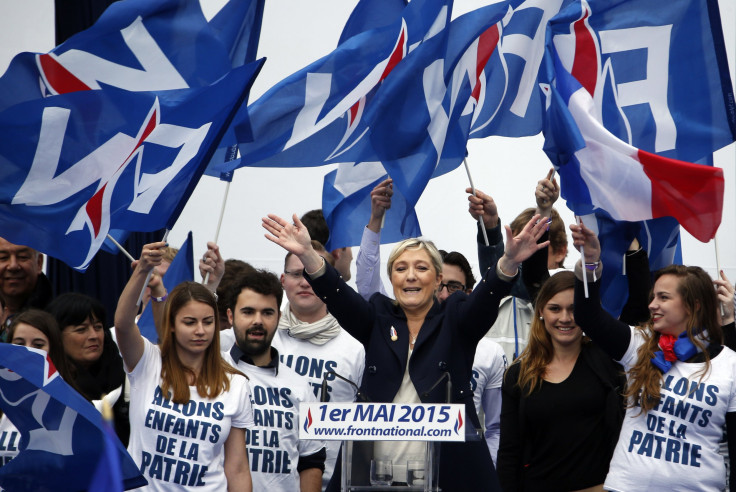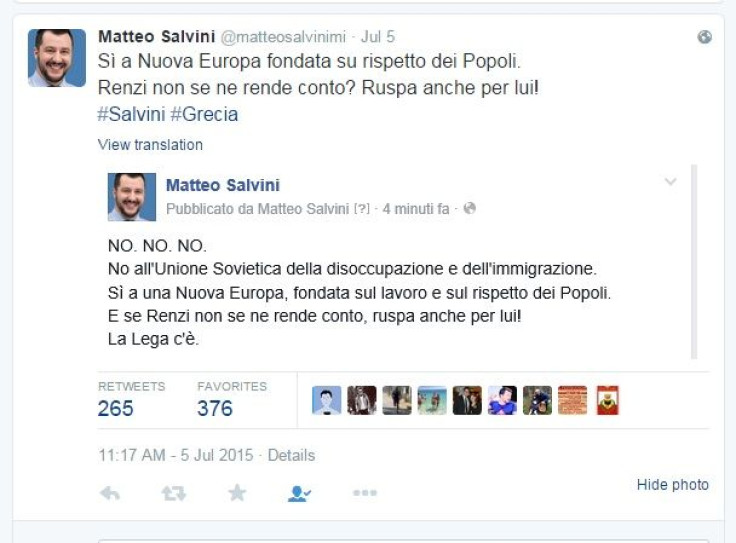Europe's Right-Wing Leaders Cheer Greece's 'Oxi' Vote, Push For End Of European Union

Marine Le Pen, leader of the far-right National Front Party in France, hailed Greece’s "no" vote as a “victory of the people against the oligarchy of the European Union,” in an official statement released Monday. In the statement, Le Pen went on to encourage other European countries to re-evaluate the entire foundation of the European Union and to take stock of the "failure of the euro and austerity, and organize the dissolution of the single-currency system, which is needed to get back to real growth, employment and debt reduction,” Reuters reported.
Le Pen isn't the only right-wing leader in Europe to cheer Greece’s recent decision to reject a new bailout package. After the Greek people voted Sunday to soundly reject any proposal that would require further austerity measures, extreme right-wing leaders across Europe are heralding the vote as the first victory in a battle against European institutions. While the vote in Greece was backed by the leftist Syriza party, radical right groups across Europe, particularly in countries that were principal loan creditors such as France and Germany, have used the Greek referendum results to question the basis of a European Union and a shared currency.
"NO. NO. NO. No to the Soviet Union of unemployment and immigration. Yes to a New Europe, founded on work and respect for the People," tweeted Matteo Salvini, leader of the anti-euro Italian Lega Nord (Northern League), after the referendum Sunday.
Many of the anti-EU radical right movements began as early as the 1990s when the shared currency of the euro was first proposed and then introduced in 2002. Critics from countries across Europe perceived the change as a challenge to national identities. At the same time, regulations concerning migrants and refugees were implemented that effectively allowed asylum seekers and other undocumented people to move freely among EU countries. Right-wing groups, such as the National Front, the U.K. Independence Party and Lega Nord in Italy sprouted up to capitalize on anti-immigrant sentiment and build their voter base.
After the global recession that began in 2007, as the euro sunk and unemployment rose sharply, even more radical right-wing groups exploded onto the political stage, gaining mainstream appeal with people who were frustrated with the lagging economy and exasperated by international leadership. Some of the groups that started around the recession include the Alternative for Germany party and the Danish People's Party.
The anti-European Union parties have blamed Brussels for struggling local economies in Portugal, Ireland, Italy and Greece, as well as the wider economic crisis in Europe, and have strongly opposed the type of European interventionism that has dominated economic stimulus packages in the region since 2011. Ahead of Greece's referendum Sunday, many came out in support of the "no" vote.
Le Pen rose to prominence in the French political arena in the past year as her party, the National Front, won over 25 percent of votes nationwide in the local elections in March, Open Europe reported. The party has gained important ground in local elections and are looking to present Le Pen as a presidential candidate in 2017.
After the referendum, Le Pen attempted to galvanize supporters by coming out in a firm stance against the EU. But Le Pen was vague about her own economic plan for Greece. Her official statement offered no alternatives to the current bailout plan on the table from Germany. The central contradiction of her position is that the National Front doesn’t want to give any more money to the Greeks via the EU, but by supporting the Greeks' refusal of the July 5 bailout package, they are implicitly supporting the additional money that Greece would require.
A March 2015 Gallup poll reported that 22 percent of French citizens were in favor of France leaving the EU, against 73 percent who wanted to stay. The majority of people who criticize the EU in France are moderates that question how the EU is being run, not its entire existence.
"Parisians are rather perplexed on this issue, and can have opinions on this subject that span between... solidarity, bitterness and confusion concerning a dossier that is quite technical," said Jean-Marc Siroen, a professor of economics who specializes in international economy at the Université Dauphine in Paris.

In Germany, one of the most outspoken opponents of the EU is the right-wing Alternative For Germany party, chaired by Frauke Petry. Petry, who has been compared to Le Pen for her anti-Europe stance and xenophobic rhetoric, was elected in a landslide by 68 percent of the vote on Saturday, ousting the party’s founder, Bernd Lucke.
It's no coincidence that Petry was elected the day before the Greek referendum. She leaned heavily on a stronger anti-European integration platform that went well beyond Lucke’s initial anti-euro ideas.
The “no” vote in Greece struck a particular chord with Germans given that Germany has been the largest creditor of Greek loans and German Chancellor Angela Merkel the senior orchestrator of many bailout plans. A March 2015 poll showed that Germany had the highest approval rating of EU leadership at 69 percent approval, with 37 percent believing Germany was better off in the EU and 88 percent of Germans wishing to stay in the EU.
In the wake of Greece’s "no" vote on Sunday, however, many Germans have become more frustrated with Greece’s position in the eurozone. A poll conducted in June 2015 showed that 70 percent of Germans wanted Merkel to stick to the strict austerity measures that were proposed in the most recent bailout package and not to cede to Greek demands, the Wall Street Journal reported.

Leaders from the U.K. have long been some of the most outspoken critics of the European Union as well as some of the least participatory. The U.K. is still on its own currency, the sterling, and only 60 percent of the nation wanted to stay in the EU when polled, making it the country with the second-lowest approval ratings of Brussels, followed only by Cyprus.
While the U.K. could soon leave the EU, current public opinion supports staying in while Prime Minister David Cameron attempts to negotiate better membership terms. Cameron was recently re-elected in a Conservative majority win in May. Many members of his party have been pressuring him to leave the EU, and Cameron said he would try to have a referendum on the U.K. leaving the EU in 2017.
His rivals could find an opportunity to gain more supporters after the Greek vote. Nigel Farage, leader of the U.K. Independence Party, declared "The EU project is now dying” after Sunday’s referendum, Reuters reported. Farage has long advocated for a "Brexit" from the European Union and his Independence Party won 12 percent of the vote in Britain’s general election in May.
Julie Smith, a professor of political science who has researched European integration at Cambridge University in England, said Farage's party has “helped set the agenda for euroskeptics broadly” and inspired even more radical, peripheral parties to spring up.
“[Greece] has decided that it wants to take on countries like Germany in a way that isn’t necessarily helpful for constructive engagement," said Smith. "It also sends signals to the U.K. Independence Party and others, many in the Conservative Party who are not happy about the EU, to say: ‘Well, If we say ‘no,’ we can try again to get a better deal,'” she added.
© Copyright IBTimes 2024. All rights reserved.












